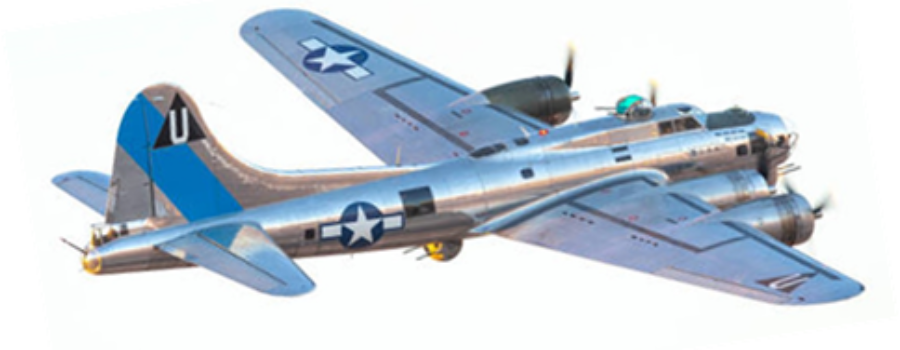“Fortress” Leadership —
The other day I had the pleasure of having lunch with Jeff Smith, CEO of Voltage Leadership. We met at one of
my favorite BBQ places with somewhat of a military theme and pictures of veterans from all branches of services.
The pictures made me think of family members who served. My dad was in the South Pacific, uncle-in-law with
101st in France, brother in the Navy and mom was “Rosie the Riveter” who hand assembled aircraft engine superchargers.
I was also reminded of a movie named “Fortress” which came out in 2012. It was about a B-17 Flying Fortress crew carrying out bombing missions in Italy in 1943 from their base in northern Africa. The movie also contained several excellent lessons on leadership.
In the movie, which is based on true events, each B-17 crew was assigned to carry out 25 bombing missions over Italy. Only two out of ten would actually survive 25 missions. Once up in the plane, the chances of not coming back were pretty good.
This meant the flight crews all knew somebody who didn’t make it back. It was huge psychological burden to bear knowing they might be next. It was typical that some crews coped with their losses by numbing themselves with whatever was available. Many turned to alcohol as did the crew of B-17F number 4224503, aka the “Lucky Lass.”
Leadership Lessons from The Fortress
1) Learn your people and know what is important to them
2) Act on what is important to them – demonstrably
3) Understand the leadership space and role you occupy
4) Learn from your mistakes and do not repeat them
5) Make sure your people have the right tools to do their jobs
6) Build trust by advocating for your people – assertively if necessary
7) Recognize your people when it counts – publicly, and not just in corporate-speak
8) Go to bat for your team, take responsibility for their performance – own it.
9) Show integrity & courage to overcome the counterproductive status quo
10) Sagaciously mentor others coming behind in order to complete your mission
The plane’s nickname was because of their predominantly Irish-American crew.
Their story unfolds below:

On July 5th, 1943 during a bombing raid on Grebin, Italy, the Lucky Lass is heavily damaged and the Number one pilot “Pops” and two gunners are killed. Five days later, “Wally” the co-pilot is now the Lucky Lass commander. Replacements arrive including new #2 co-pilot Michael Schmidt (the primary subject of our leadership lessons), and two new waist gunners. Waist gunners were located behind the wings on each side of the B-17. On their walk-around of the North African base, the replacements are introduced to the alcohol still that the flight engineer has put together from bomber parts and other scraps. He explains that the Army adds ethanol to boost the octane of aviation fuel, so they are cooking the fuel to distill out the alcohol
Alcohol was part of ritual by which the crew mourned and numbed themselves to their losses. They were holding a wake for lost pilot, “Pops”. They also celebrated each safe return to base.
Newbie #2 co-pilot Schmidt, who doesn’t drink, skipped the wake immediately alienating him from the crew.
First big mistake. Wally, the new #1 pilot took the new young co-pilot outside and gave him some mentorship on
trying harder to gain the crew’s acceptance.
His crew had to trust his ability to lead the mission, fly them into danger, and bring them back safely to fight again another day. The pilot had to trust his people to do their jobs, so that they did what was needed to be done.
The next mission was supposed to be an easy mission, take out a target in Messina, Sicily. Wally the #1 pilot hands the control over to #2 Schmidt as he got sick from food poisoning. Schmidt doesn’t use instrument navigation and they go off course over territory heavily defended by anti-aircraft guns. Second big mistake They abort the run and manage to make it home safely.
Schmidt tells Wally that he’s going to apply for a transfer to another plane as he overheard the crew making cutting comments about him. He also heard complaints that they won’t get credit towards the 25 for what was supposed to be an easy mission. Wally suggests he admit his mistake and apologize to the crew.
During the night, there was a fierce sandstorm forcing everyone on the base to take cover. The flight engineer finishes collecting a batch of alcohol but forgets to shut down the still. The still explodes and the crews source of liquid comfort is gone.

For the crew, things appeared to be going from bad to worse. To help boost their confidence in Schmidt, Wally lets him take the #1 pilot’s chair for the next mission. That was supposed to be another easy mission to Messina.
Shortly after takeoff, they noticed the engine’s oil pressure rising rapidly. The engines begin losing power. The Lucky Lass is forced to abort another mission for which they will not get credit. The crew blames Schmidt, superstitiously thinking he is a jinx. His German name being Schmidt didn’t help matters much with the Irish crew.
The rest of the squadron returns to base all shot up. It had not been the easy mission they expected. During the debriefing it was learned that the squadron’s fighter protection was diverted, and enemy fighters had unexpectedly shown up over the target. Wally tells Schmidt that by aborting the mission, he had probably saved all of their lives.
With the squadron decimated, some of the Lass’ people are mixed into other crews for the next mission. Schmidt feels guilty at missing yet another mission. However, his crewmates point out this is a blessing in disguise because as the only officer on the ground, he can ensure that the ground crew fixes the Lucky Lass properly.
After having worked all night to ready the squadron for the day’s mission, the ground crew leader refuses to order his men to work in the 105 degree heat to re-check the Lass. He said they have already checked the plane and didn’t find any mechanical problems. Schmidt assertively pulls rank and won’t back down assuring his crew has the proper tools to go into their flying war.
Since rising oil pressure was the problem, Schmidt insists they take apart the oil pumps despite the new pump having been installed just the previous week. The ground crew chief reluctantly follows orders. He discovers that the oil lines have been fouled with sand from the last sandstorm.

To celebrate their safe return, but with no alcohol left, the flight engineer is caught stealing whiskey from the officer’s club by the quartermaster. He is facing a court-martial and summary dismissal. Schmidt, the newly minted leader, arrives just as the base C.O. asks the flight engineer if he has any explanation.
Schmidt relays the news about newly discovered mechanical problems and claims he ordered his crewman to get alcohol to use as a solvent to clean sand from the oil lines. Schmidt accepts blame because he wasn’t explicit enough in his order to get it legitimately. He further explains that the flight engineer is a valuable and integral part of our team. Without him it would be impossible to fly. The C.O. appreciated his fighting spirit, pretends to believe the ridiculous story, and lets the crewman off.

The quartermaster protests the decision but gets dressed down by the C.O. The C.O. tells him we are fighting a war and that he doesn’t have time to waste on anything that doesn’t affect the operational efficiency of the squadron. He unceremoniously dismisses the quartermaster. The leader has arrived by going to bat for his crew.
Before dismissing the flight engineer, the C.O. asks why he only grabbed Scotch whiskey? The crewman replied that the Lucky Lass was an Irish-American bomber and had discriminating taste. The C.O. took a bottle of scotch from the case for himself. That night the whole crew celebrated, and they declared Schmidt to be an honorary Irishman, christening him, “O’Schmidt“. On July 19th the Lucky Lass took part in the mission to bomb Rome. Rome was heavily defended by anti-aircraft batteries. On the final run, despite several crew being wounded, they released their bombs over the target.
As they made the turn toward home base, a B-17 flying above them is hit and falls in their direction. The doomed bomber’s wing clips part of the Lass’ right horizontal stabilizer, causing them to go into an uncontrolled climb until they stall. The plane loses altitude rapidly as Wally and Schmidt struggle to regain control.

They both managed to pull their damaged B-17 up but were very low over Rome and taking heavy ground fire.
As they reached the edge of Rome, a flak burst kills the #1 pilot, Wally. It also took out another engine.
Back in the waist area of the B-17, flak killed a gunner and wounded the navigator .The navigator makes his way to the cockpit without saying a word about being hit. He looked at the mess of flesh that used to be Wally before climbing into the #1 seat.

The Lucky Lass got away from Rome and made a run for a British airbase in Malta. The damaged port-side landing gear fell away as it was being lowered. This leaves Schmidt no choice but to order everyone to bail out of the Lucky Lass
Schmidt didn’t notice that the navigator was severely wounded and left the cockpit with him at the controls. As the #1 pilot and commander, Schmidt, helped the crew bail out. The navigator opened the bomb bay doors and made his way back to Schmidt as the last of the crew exited the plane. The heroic navigator knew he was not going to make it.
As Schmidt tried to help him get ready to bail out, he saw his parachute had been destroyed. Schmidt said that they can try to land on the water, or both jump together using his parachute.

The navigator nodded, but he then told Schmidt to “take care of the boys” and pushed him out of the plane. He made one last attempt in the pilot’s chair to take control of the B-17. It is too damaged and disintegrates taking the navigator with it. Schmidt survived along with several of his crew. He was now the #1 pilot since Wally was killed in action. Back at the base, the new replacement #2 co-pilot checked in with Schmidt, the flight commander of a new bomber. Thus the cycle of mentorship starts again…!
Moral of the story:
Learn your people and know what is important to them; Act on what is important to them – demonstrably; Understand the leadership space and role you occupy; Learn from your mistakes and do not repeat them; Make sure your people have the right tools to do their jobs; Build trust by advocating for your people – assertively if necessary; Recognize your people when it counts – publicly, and not just in corporate-speak; Go to bat for your team, take responsibility for their performance – own it; Show integrity & courage to overcome the counterproductive status quo and Sagaciously mentor others coming behind in order to complete your mission




